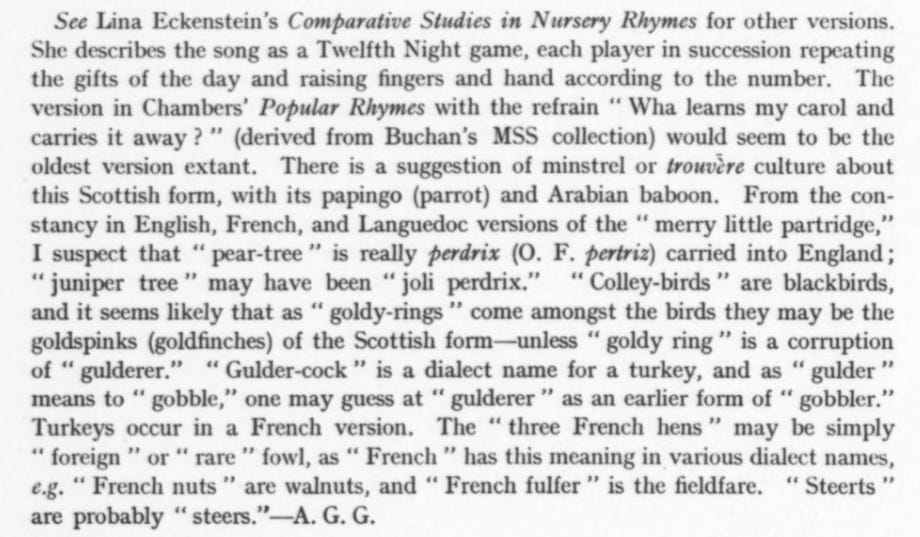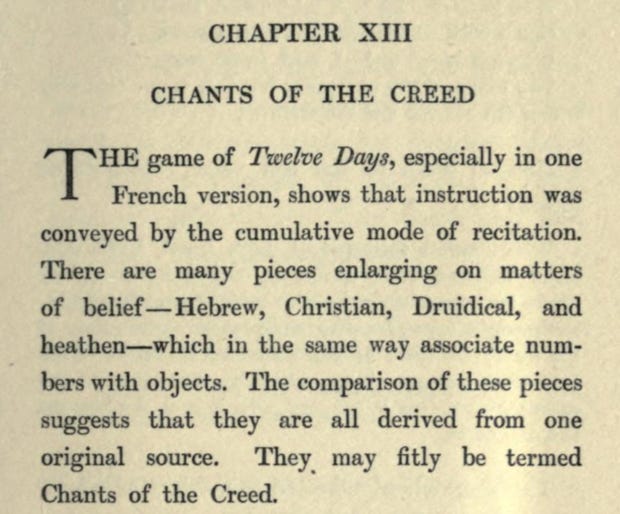ROUD 68: The Twelve Days of Christmas
AKA: Partridge in a Pear Tree, The Yule Days, The Six Days of Christmas, The Christmas Presents, What My True Love Sent, Christmas Song

Ignoring the fact I am writing about a Christmas song on a beautiful May* morning…
…this is almost certainly derived from a rich vein of Northern European pre-Christian traditions based around the winter solstice; similar cumulative songs can be found in many countries, including France, Sweden and the Faroe Islands. It most likely became popular in Britain as a children’s memory-game, with its first known appearance in a small illustrated book of nursery rhymes called “Mirth Without Mischief“ in around 1780. Christian scholars have applied catechistic value to the song, with each of the gifts representing some tenet of the faith, although evidence seems to point to this application is only a few decades old.
*It would have to be May, wouldn’t it? A month famously not untroubled by traditional song. Anyway, don your paper crown, apply your unfurling paper trumpet to your gravy-moistened lips, and let’s plough on.
Music
Before the unforgettable tune we all know was applied to the rhyme by composer Frederic Austin in around 1905, there were a few variations to the order and composition of the burgeoning bestiary. Some of these may have been cultural changes, but many I imagine in many cases was due to the effects of imperfect memory, especially under the influence of a yuletide hot toddy or three. Austin’s popular arrangement however soon led to the standard form we know (and beyond about the seventh day, still struggle to remember) today. Obviously, it’s not a hard song to track down in this standard form, but if you’re looking to find one with some traditional folk heritage, you might enjoy this:
… from Martin Carthy, Shirley Collins, Floella Benjamin, Isla St Clair and Children of Britannia Row.
Another classic version that has endured through the latter half of the twentieth century is from the peerless folk orchestra known commonly as The Muppets, with the help of Jon Denver.
Unsurprisingly, you can find this song in just about any genre you might desire, here is a delightful hip hop version.
Or perhaps an instrumental heavy metal version, complete with shredding, is more your cup of tea.
Or for you 90s kids, have some pop punk.
If you really want to test your stamina, you could attempt to endure this instrumental avant-garde brass interpretation, which almost immediately throws out the familiar tune in favour of a near random selection of parps and honks expressed over an apparently unrelated drum solo. Some *might* suggest that this is an improvement on the festive over-familiar version.
OK, that’s quite enough of that. From a traditional song perspective, non-Austin versions are hard to find, but we can turn to the rightly venerated Copper family who have their own satisfyingly different-yet-familiar tune and pre-Austin set of gifts, including the slightly troubling, from a modern animal welfare perspective, “eleven bears-a-baiting” verse.
Bonus gift: I found this on Bandcamp. It’s an album where each of the twelve days is given its own ambient electronica treatment, made by the mythical artist/recluse Hermione Harvestman. More about Hermione here, from involuntary Sing Yonder contributor (I purloined - ultimately with his permission - a couple of his elegantly bowdlerized verses for Roud 39 - seek out Sing Yonder vol. 4 to see them) and general outré cultural one-man storytelling factory Sean Breadin who “discovered” her in a nursing home in 2003. She died in 2012. (Actually she is an alter ego of Breadin himself. Or is she? Does it even matter? Anyway, enjoy the music.)
The regular and thankfully incomplete Youtube playlist for Roud 68 can be found here for archival purposes, although I won’t be offended if you don’t ever listen to it - I certainly won’t.
Sources
Here’s the aforementioned book of children's rhymes which contains the first known mention of this song in English:
The subtitle “Sung at King Pepin’s Ball” is an intriguing detail. King Pepin, AKA Pepin The Short ruled France in the 8th century, and was one of the most powerful people in Europe at the time. How the editor of this book of nursery rhymes knew what was performed at a party some 1000 years earlier, I can’t begin to imagine, but it all does rather point to the idea that the song has its roots in medieval France, especially since the French word for partridge is “peirdrix” - which does indeed sound like “pear tree”, and indeed might have connection with “juniper tree” which also appears in some early versions. There is a similar French song, also collected in the early 20th century but of probably much older origin called “La Peirdriole” that takes an almost identical form.
One of the most notable proponents of this theory was Cecil Sharp, who collected several early pre-Austin versions of the song in various places around Britain:

You can read the 1903 book “Comparative Studies in Nursery Rhymes“ cited by Sharp online here. The relatively unknown but evidently extremely awesome scholar/author/polymath/adventurer Lina Eckenstein (1857 – 1931) has an interesting subsequent chapter that provides evidence that this form of “cumulative recitation” may be descended from an earlier practice of ecclesiastical chanting found in many religions, including Christianity and Judaism, as well as druidic and pagan practices.

A cursory search for meanings behind the particular gifts will lead you quickly to a list of connections to Christian principles, like this, claiming that the song was created by persecuted Catholics as a coded way to secretly sing about their faith. There is no credible evidence that this was the case, and is most likely an internet-assisted bit of post-hockery. Which is all fine with me - whatever gets you through the night.
Finally, honourable mention must go to legendary computer scientist and statistician Donald Knuth who included a droll yet rigorous scientific analysis of the complexity of this and other repetitious songs in his 1977 article “The Complexity of Songs”.
Parodies
Good grief, the parodies. Could this be the most parodied song of all time? I think it must be. These range from the hyper-local town concerns - eg. this from our local rock band White Van Man (this list will mean nothing to anyone outside of about three miles from where I’m sitting):
to the profane, political, and, well, anything really. To paraphrase Rule #34 of the internet (don’t Google that if you don’t know what it is and you are of a sensitive disposition), if it exists, then there is a Twelve Days of Christmas of it. Since it requires very little skill or imagination to create a list of twelve things that don’t rhyme, the vast majority of parodies, it must be said, fall into one of two categories (or frequently both), namely, (a) tooth-drillingly unfunny, or (b) downright offensive.
Here are a few examples I stumbled across. I’m sorry in advance. First of all, an example of the form applied to poaching by questionable Norfolk parody-merchants The Kipper Family. Having grown up in rural Norfolk, it is ringing some uncomfortable bells for me.
Taking it more highbrow for the classical music fans, here is a music history lesson in Twelve Days of Christmas form:
Professional faux-drunk comedian Jeremy Lion famously gave his port-fuelled take on it, televised here in 2007.
Lion’s inebriated film-rundown section was taken to its extended logical conclusion by movie-obsessed folk musician Matt Quinn in this (almost) unbelievable feat of memory - the comprehensively nerdy nature of which wins it the prize for the best ever Twelve Days parody:
With that, if you have got this far, I thank you for following me down this festive cul-de-sac. The normal service of imaginary lords and ladies of old being awful to one another will now resume!
Draft pages and audio guide
Keep reading with a 7-day free trial
Subscribe to Sing Yonder: A Practical Guide to Traditional Song to keep reading this post and get 7 days of free access to the full post archives.






